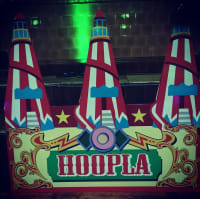The History of Hoopla (Quoits)

Hoopla, also known as Quoits, is a funfair game steeped in rich history and cultural significance, with its roots supposedly tracing back to ancient times. The main difference between Hoopla and Quoits, other than the name, is that Hoopla is typically played at funfairs and fairgrounds for prizes, whereas Quoits is usually a garden game played for fun and competition.
This traditional fairground game, which involves the throwing of rings over a set distance to land over a spike, has evolved over centuries and remains a popular pastime at fairgrounds and social gatherings of all descriptions.
The earliest known reference to a game resembling Quoits can be linked to a Greek myth. It is believed that the ancient Greek deity Apollo was playing this game with his lover Hyacinth. The ring (a discus) was blown off-course by the west wind Zephyrus, who was jealous of Apollo's relationship and wanted Hyacinth to themselves, and this ring ended up striking Hyacinth, leaving him with a mortal wound. From their blood, the Hyacinth flower appeared.
Despite these apparently ancient origins, it was not until the 19th century that Quoits began to be documented in detail. The game's official rules were first published in the April 1881 edition of 'The Field.' These rules were defined by a body formed from pubs in Northern England.
Quoits and Hoopla Etymology
The term 'coyte,' meaning a flat stone thrown in a game, possibly derives from the Old French 'coite,' which translates to a flat stone, or even from 'coilte,' meaning a cushion.
'Hoopla' was used as a term to 'gee up' working animals such as dogs and horses, and is still used in this form today. This is thought to be a form of onomatopoeia. The use of the term to refer to a funfair game is likely an example of 'broadening' in semantic change, which is when the definition of a previously-existing word becomes larger, and would have been a play on words to refer to the hoops involved in the game.
Modern Hoopla and Quoits
Today, Quoits encompasses several distinct variations, with the garden version existing largely for recreation or as a skill game found at fairgrounds and village fetes. Unlike its historical counterpart, the modern game doesn't adhere to leagues or universally accepted standards of play, with rules often agreed upon before commencement.
The fairground version of Hoopla is a familiar sight at fairs, where participants pay a stallholder for the chance to throw wooden hoops over prizes. Successful players win the prize they hoop, although the odds are often in favour of the stallholder. This version of the game balances skill with chance, making it a perennial favourite at funfairs and fairgrounds across the world..
From its mythological origins to its presence at modern-day fairs, the game of Hoopla or Quoits has been a constant source of entertainment. Its simple yet engaging format has allowed it to endure and adapt through time, making it more than just a game - it's a part of our cultural heritage. At We Are Tricycle, we celebrate this timeless game by offering it as part of our funfair attractions, inviting players of all ages to partake in a piece of history. Contact us to book your spot!